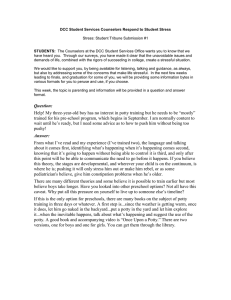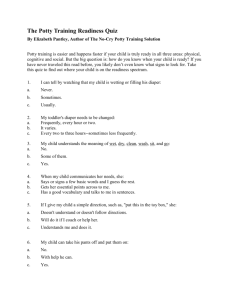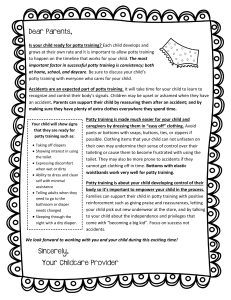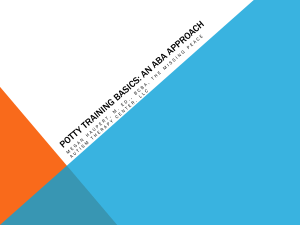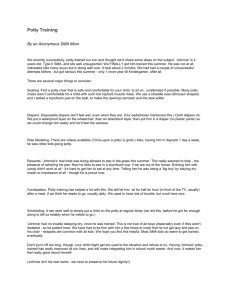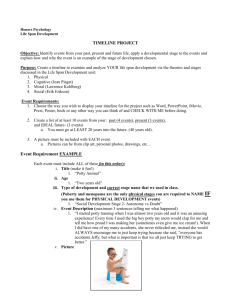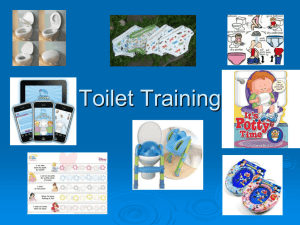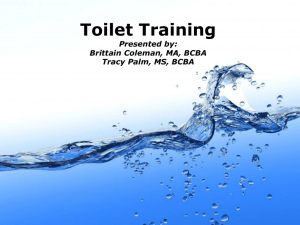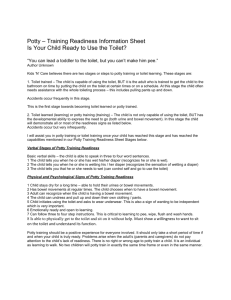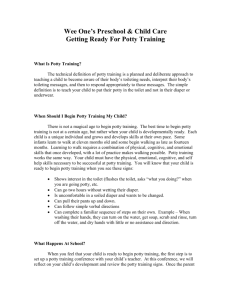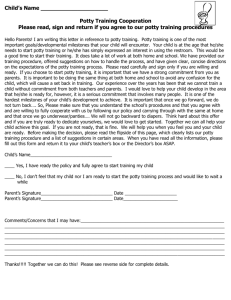Potty Training the Preschool Child
advertisement
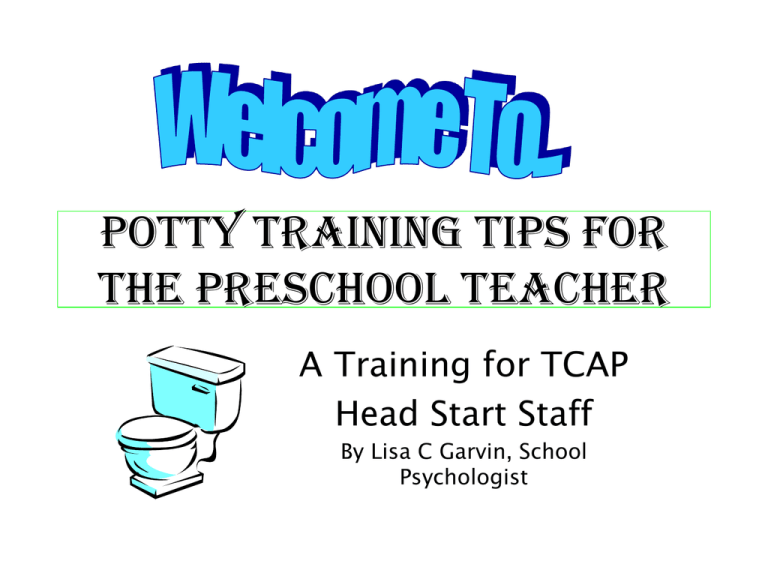
Potty Training TIPS FOR the Preschool TEACHER A Training for TCAP Head Start Staff By Lisa C Garvin, School Psychologist Goals… • To Review Readiness/Development • To Discuss Common Problems and Possible Solutions • To Provide Tips for Parents Some Initial Thoughts…. • If a child enters preschool and is not trained, keep a log/diary for a few days to look for patterns. • Consult with the family and decide which words to use. • Routine is important. Using a timer or clock may be helpful. Some Initial Thoughts…. • Every child is an individual. What works for one may not work for another! • Must consider the developmental level of each child and plan toilet training techniques accordingly. Areas of Readiness Motor Cognitive Language Toileting Skills Areas of Readiness Motor • Able to squat without losing his/her balance • Able to dress/undress his/her self with limited help Areas of Readiness Cognitive • Demonstrates imitative behaviors • Plays make believe • Able to sit down or play quietly for about 5 minutes Areas of Readiness Language • Able to understand simple requests • Able to show his/her needs using words, signs or gestures • Can name urine and bowel movements Areas of Readiness Toileting Skills • Able to stay dry for at least an hour or two • Awareness of what the toilet is for • Aware of being wet or soiled with consistent bowel movements • Not currently experiencing a stressful situation Common Problems & Solutions • Resistance • Refusal • Won’t have a BM on the potty • Was trained but has regressed Resistance Too many reminders Too many lectures Forced to sit on the toilet against their will Punishment Resistance InvestIgate… • • • • • Confusion Anxiety/Fear Control – Independence Issues Too much pressure Physical Pain Refusal to Use the Toilet Why? Possible Reason… It is big…cold Makes loud noises Things disappear in it never to be seen again Refusal to Use the Toilet How to Help? 1. Need to increase their comfort level. 2. Reassure them that is what is supposed to happen. Says, “NO!” Why? Possible Reason… May be discovering that “NO” is a way to exert power. Control and independence issues Says, “NO!” How to help? 1. 2. 3. 4. 5. Talk to the Parents… Resist Reminding Don’t Hover Be Calm About Accidents Reward Good Behavior Won’t Have a BM on the Potty • • • • • • Very common problem Fearful of making a mess Observe and Log Use a pull up/diaper Watch for constipation Talk about body functions Was Trained…Has Regressed • Even small changes • Be careful not to push • Find ways to reinforce his/her independence More Suggestions • Establish a reward or incentive for using the potty. • Have the child involved with changing themselves • May need visual references along with verbal directions for the step by step process • Establish a specific routine for children that have many accidents Some Specific Incentives • • • • • • Inexpensive trinkets wrapped like presents Stickers/Stamps Tickets to redeem for rewards Printable coloring pages Activities Legos Helpful Strategies for Parents If they are having trouble… • • • • • • Books and videos Siblings Monitor fluid intake Use easy to remove clothing Share what works at school Reminders to remain calm and positive More Advice for Parents • Expect accidents • Do not blame or threaten the child • Explain expectations (“Next time ask for help”) • Do not insist the child stay on the toilet more than a few minutes • Create a routine with the parent Books/Resources • • • • • • • • • • Your New Potty by Joanne Cole Oh Oh! Gotta Go! By Bob Mc Grath The Princess and the Potty by Wendy Cheyette Lewison When You’ve Got to Go! by Mitchell Kriegman The Potty Book for Boys/Girls by Alyssa Satin Capucill Potty Time by Guido van Genechten All By Myself by Anna Grossnickle Hines Once Upon a Potty by Alona Frankel Everyone Poops by Taro Gomi A Potty for Me!: A Lift-the-Flap Instruction Manual by Karen Katz
